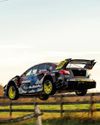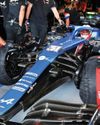
It is widely known that Formula 1 had assembled a group to conduct its own aerodynamics R&D during 2018-19, seeking a solution to the thorny problem of enabling the cars to race closely and to overtake more easily. In late 2019 that work was presented in outline, along with the FIA’s regulations for 2021, which encompass major aerodynamic changes to create a package that is intended to allow reasonably high downforce with a more benign wake.
The nature and intent of the changes were detailed in January’s issue (V30 N1), but in essence the new regulations outlaw the complex multiplicity of devices ahead of and behind the front wheels that, in the creation of downforce and the control of wheel wakes, were deemed simultaneously to be causing excessive disruption to the airflow encountered by following cars. This characteristic made it very difficult to follow another car closely, especially through high speed ‘aero’ corners, because of the substantial downforce losses incurred by the following car.
So next year we will have a return, after almost 40 years, to ground effect underbodies (though not quite as we saw back in the late 1970s and early ’80s), simpler front wings and front wing end plates, wheel covers and a modified rear wing, all of which is designed to contribute to a narrower wake that, furthermore, is directed upwards behind the racecar to leave an improved environment in which a following car can operate. With numbers and visualisations from its own aerodynamics research to back up these claims, there seems to be good reasons for hope for F1.
Bu hikaye Racecar Engineering dergisinin April 2020 sayısından alınmıştır.
Start your 7-day Magzter GOLD free trial to access thousands of curated premium stories, and 9,000+ magazines and newspapers.
Already a subscriber ? Giriş Yap
Bu hikaye Racecar Engineering dergisinin April 2020 sayısından alınmıştır.
Start your 7-day Magzter GOLD free trial to access thousands of curated premium stories, and 9,000+ magazines and newspapers.
Already a subscriber? Giriş Yap
Talk the torque
More thoughts on in-wheel motors and their effects on twisting force
Rolling about
An explanation of the limitations of a previous load transfer article, bringing jacking forces into the mix
F1 breaks schedule records
The FIA has confirmed no fewer than 23 races on the 2022 Formula 1 World Championship schedule, the highest number of grands prix ever to be held in a single season, and that has led to criticism from some teams that will be on the road for eight months.

Under pressure
Toyota may have finished first and second at Le Mans this year, but the effort required to overcome a fuel delivery problem and finish with both cars was Herculean
Physics at work
Dutch company, Intrax, offers Racecar Engineering an insight into the technologies it employs to optimise its suspension products
Williams' 2030 ambition
Williams Racing has committed to becoming climate positive by 2030 as part of an all-new sustainability strategy.
Diff'rent strokes
Racecar looks at the different types of mechanical differential, their benefits and limitations
Das Boot
A curious Twitter exchange fired up a unique, hydrogen-powered, cross-country project that will contest the Baja 1000 in November 2022

Air born
Every racecar engineer's dream is a blank sheet of paper design. When Hoonigan and Subaru approached Vermont Sportscars about building the next generation of Gymkhana racer, that's just what the company was given

Remote control
Called variously ‘virtual garages’, ‘mission control’ or ‘race support rooms’ is the future of race engineering sitting in the warm back at HQ?